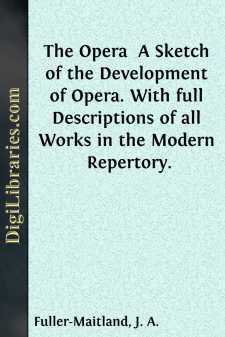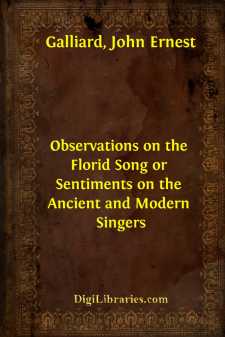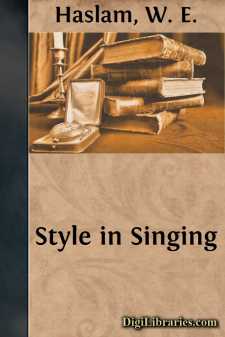Categories
- Antiques & Collectibles 13
- Architecture 36
- Art 48
- Bibles 22
- Biography & Autobiography 813
- Body, Mind & Spirit 142
- Business & Economics 28
- Children's Books 14
- Children's Fiction 11
- Computers 4
- Cooking 94
- Crafts & Hobbies 4
- Drama 346
- Education 46
- Family & Relationships 57
- Fiction 11828
- Games 19
- Gardening 17
- Health & Fitness 34
- History 1377
- House & Home 1
- Humor 147
- Juvenile Fiction 1873
- Juvenile Nonfiction 202
- Language Arts & Disciplines 88
- Law 16
- Literary Collections 686
- Literary Criticism 179
- Mathematics 13
- Medical 41
- Music 40
- Nature 179
- Non-Classifiable 1768
- Performing Arts 7
- Periodicals 1453
- Philosophy 64
- Photography 2
- Poetry 896
- Political Science 203
- Psychology 42
- Reference 154
- Religion 513
- Science 126
- Self-Help 84
- Social Science 81
- Sports & Recreation 34
- Study Aids 3
- Technology & Engineering 59
- Transportation 23
- Travel 463
- True Crime 29
The Opera A Sketch of the Development of Opera. With full Descriptions of all Works in the Modern Repertory.
Categories:
Description:
Excerpt
If Music be, among the arts, 'Heaven's youngest-teemed star', the latest of the art-forms she herself has brought forth is unquestionably Opera. Three hundred years does not at first seem a very short time, but it is not long when it covers the whole period of the inception, development, and what certainly looks like the decadence, of an important branch of man's artistic industry. The art of painting has taken at least twice as long to develop; yet the three centuries from Monteverde to Debussy cover as great a distance as that which separates Cimabue from Degas. In operatic history, revolutions, which in other arts have not been accomplished in several generations, have got themselves completed, and indeed almost forgotten, in the course of a few years. Twenty-five years ago, for example, Wagner's maturer works were regarded, by the more charitable of those who did not admire them, as intelligible only to the few enthusiasts who had devoted years of study to the unravelling of their mysteries; the world in general looked askance at the 'Wagnerians', as they were called, and professed to consider the shyly-confessed admiration of the amateurs as a mere affectation. In that time we have seen the tables turned, and now there is no more certain way for a manager to secure a full house than by announcing one of these very works. An even shorter period covers the latest Italian renaissance of music, the feverish excitement into which the public was thrown by one of its most blatant productions, and the collapse of a set of composers who were at one time hailed as regenerators of their country's art.
But though artistic conditions in opera change quickly and continually, though reputations are made and lost in a few years, and the real reformers of music themselves alter their style and methods so radically that the earlier compositions of a Gluck, a Wagner, or a Verdi present scarcely any point of resemblance to those later masterpieces by which each of these is immortalised, yet the attitude of audiences towards opera in general changes curiously little from century to century; and plenty of modern parallels might be found, in London and elsewhere, to the story which tells of the delay in producing 'Don Giovanni' on account of the extraordinary vogue of Martini's 'Una Cosa Rara', a work which only survives because a certain tune from it is brought into the supper-scene in Mozart's opera.
There is a good deal of fascination, and some truth, in the theory that different nations enjoy opera in different ways. According to this, the Italians consider it solely in relation to their sensuous emotions; the French, as producing a titillating sensation more or less akin to the pleasures of the table; the Spaniards, mainly as a vehicle for dancing; the Germans, as an intellectual pleasure; and the English, as an expensive but not unprofitable way of demonstrating financial prosperity. The Italian might be said to hear through what is euphemistically called his heart, the Frenchman through his palate, the Spaniard through his toes, the German through his brain, and the Englishman through his purse. But in truth this does not represent the case at all fairly. For, to take only modern instances, Italy, on whose congenial soil 'Cavalleria Rusticana' and the productions it suggested met with such extraordinary success, saw also in 'Falstaff' the wittiest and most brilliant musical comedy since 'Die Meistersinger', and in 'Madama Butterfly' a lyric of infinite delicacy, free from any suggestion of unworthy emotion. Among recent French operas, works of tragic import, treated with all the intricacy of the most advanced modern schools, have been received with far greater favour than have been shown to works of the lighter class which we associate with the genius of the French nation; and of late years the vogue of such works as 'Louise' or 'Pelléas et Mélisande' shows that the taste for music without any special form has conquered the very nation in which form has generally ranked highest. In Germany, on the other hand, some of the greatest successes with the public at large have been won by productions which seem to touch the lowest imaginable point of artistic imbecility; and the ever-increasing interest in musical drama that is manifested year after year by London audiences shows that higher motives than those referred to weigh even with Englishmen. The theory above mentioned will not hold water, for there are, as a matter of fact, only two ways of looking at opera: either as a means, whether expensive or not, of passing an evening with a very little intellectual trouble, some social éclat, and a certain amount of pleasure, or as a form of art, making serious and justifiable claims on the attention of rational people....




![How to Sing
[Meine Gesangskunst]](https://digilibraries-com.s3.eu-central-1.amazonaws.com/covers/ce5d735a-24bd-4e45-bc59-b94dfd4cd5fa.jpg)

